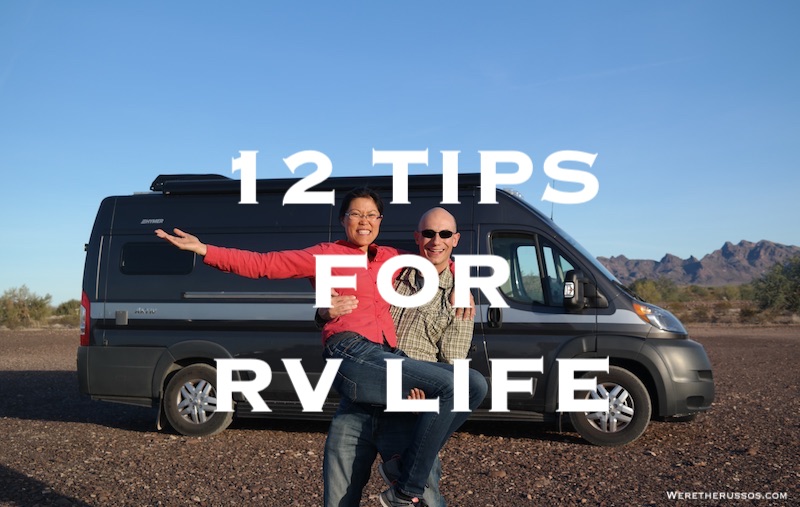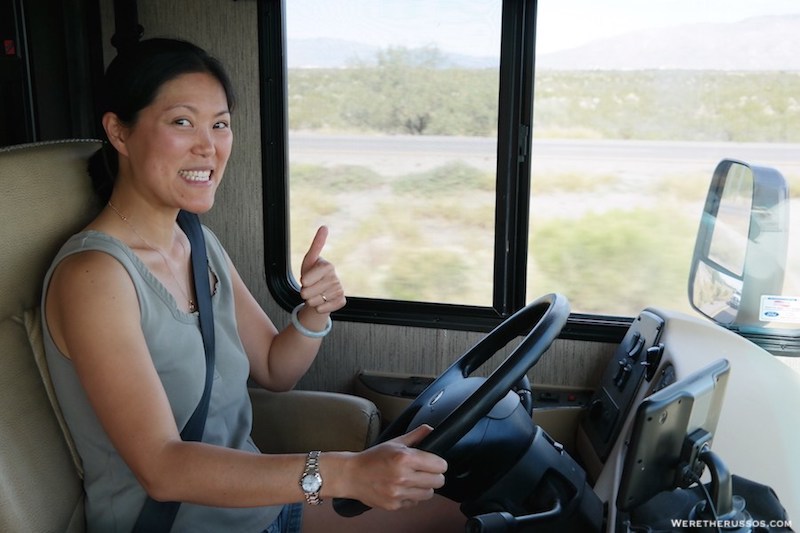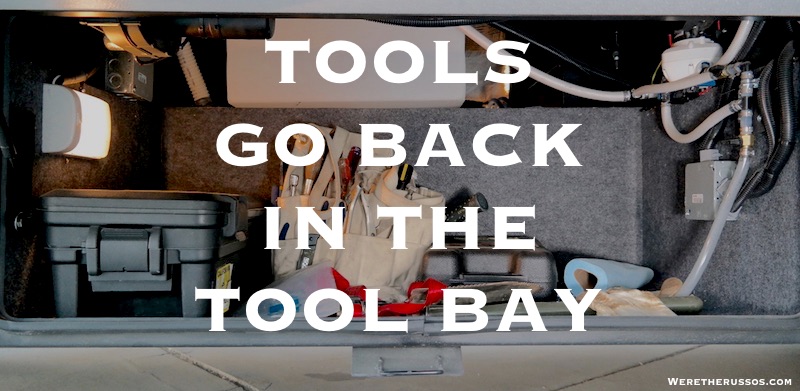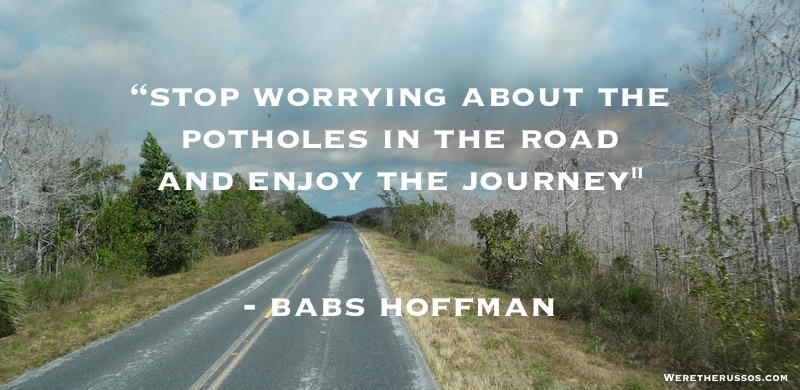This post may contain affiliate links.
Living in an RV or any small space can have its challenges. Our RV journey began back in 2015, and for the first 6.5 years, we embraced full-time RV living. Now, we’ve transitioned to traveling part-time, but the lessons we’ve learned along the way remain just as relevant. As we reflect on the past decade, these RV living tips stand out as the keys to surviving and thriving in this lifestyle. Whether you’re a solo RVer, a family of five, or a couple traveling with pets, we hope you find these insights helpful as you navigate your own RV journey.

12 RV Living Tips
If you’d rather watch than read, check out our RV Living Tips video here. Prefer reading? Keep on scrolling!
1. Communicate
Good communication is as stimulating as black coffee, and just as hard to sleep after.”
– Anne Morrow Lindbergh
The key to thriving in RV life is good communication. With limited space in an RV, it doesn’t take long for things to feel cramped—especially if frustrations or conflicts arise. When tensions build, that small space can feel even smaller. Sure, you can step outside, go for a walk, or take a drive (if you have a tow vehicle), but we’ve learned that creating temporary distance won’t solve the underlying issues.
In our first month of transitioning to RV living, a lack of communication added unnecessary stress to our relationship. Once we identified the breakdown and worked through it, life on the road became much more enjoyable—and it ultimately made our relationship stronger. Communication isn’t something you figure out once and move on; it’s a daily practice that remains just as important now, even as part-time travelers.
If you’d like to dive deeper into our first year of RV living, be sure to check out Joe’s second book, Tales From the Open Road.
2. Have the Right Gear
Having the right gear can save you countless headaches while on the road, but figuring out what’s truly “right for you” takes time and experience. Before we started RV living, we did extensive research to find the best gear for our needs. That research paid off, but we’ve also learned along the way that not every item we thought we needed was essential—and some of the best gear decisions came after we had more experience on the road.
It’s important to remember that what works for us may not work for you. Every RVer’s needs are different, depending on factors like your RV setup, travel style, and personal preferences. Don’t feel like you need to buy everything before you hit the road. In fact, some gear is worth waiting on until you get a better sense of how you RV and what you truly need to make your journey enjoyable.
If you’re looking for ideas, we’ve put together a few helpful lists of our favorite gear. Check out these posts or visit our store for inspiration:
- Essential RV Camping Accessories
- Favorite Kitchen Gadgets for RVing
- Dog Gadgets for RVing
- Apps for RV Living
3. Know Your RV
Every camper we’ve owned has come with a stack of user manuals—covering everything from how to clean and maintain the RV and awning to guides for the fire extinguisher, appliances, and even the tires.
We read through every manual and downloaded the online versions as a backup. Having a PDF version will make searching for a specific topic faster and easier. There are also build sheets, diagrams for each fuse box and information on proper tire inflation. We’ve referenced all the information many times throughout our years of RVing.
For example, when a fuse goes out at 1 a.m., you’ll want to know exactly which fuse box to check. In our first RV, there were four fuse and breaker boxes—two of which were outside. Trust us, running around in the pouring rain trying to figure out which one to open isn’t fun. Knowing your rig’s layout ahead of time can make situations like this far less stressful.
For more tips, check out our post on RV Safety & Preparedness
4. Spring Cleaning
Figuring out what to pack for RV life—whether it’s a short weekend trip or full-time living—can be a challenge. Questions like, “Is one pair of sandals enough, or do I need a second pair for campground showers?” can leave you second-guessing every decision. It’s easy to overpack, and we’ve been there. After our first month on the road, we realized we had too much stuff and decided to sell the bicycles we never used.
A few months in, we did a thorough spring cleaning, re-evaluating everything in the RV. Many articles of clothing landed in the donation pile because we hadn’t touched them since moving in. We even found items we’d forgotten we brought, saying things like, “I’ve been looking for this!” It was a great reminder that packing light and staying organized can make RV life much more enjoyable.
Spring cleaning is also the perfect time to reorganize and optimize your RV’s storage. After we decluttered, most of our cupboards, drawers, and storage bays were half empty—and that’s when we realized we could comfortably downsize to a smaller RV. Whether you’re just starting out or a few months into your journey, revisiting what you’re carrying can make a world of difference in how you live on the road.
5. Share the Drive

Looking back at the miles we covered in our first year on the road, we can’t imagine doing it solo. Unless you plan to stay in one place for long stretches or only move short distances, it’s a good idea to share the driving responsibilities.
It’s not uncommon for campground neighbors to stop by when we pull in and say to Joe, “I wish my wife drove.” But the truth is, learning to drive an RV isn’t as intimidating as it might seem. If you’re not comfortable behind the wheel yet, there are driving classes available to help you build confidence and master the basics.
The more you drive, the easier it gets. Before long, you’ll be thinking, “This is a piece of cake!” You might even start looking forward to your turn behind the wheel. Sharing the drive not only lightens the load but also makes the journey more enjoyable for everyone.
6. Develop a Checklist
After dealing with items flying off counters and drawers coming unlatched on corners one too many times, we realized we needed a pre-departure checklist. Just like pilots rely on a pre-flight checklist, having a routine checklist for your RV is essential to ensure everything is secure before you hit the road.
Every checklist will look a little different depending on your RV type and gear, but the key is to make it as comprehensive as possible—and to use it every single time you travel. Complacency can creep in, and trust us, the times we skipped the checklist were the times something was forgotten.
Save yourself the headache and stress by making this a part of your routine. For inspiration, check out our Pre-Departure Checklist.
7. Everything Has A Place

In an RV, just like in a house, everything should have a designated place—but the stakes are higher when you’re on the road. A misplaced bottle of vinegar might not seem like a big deal until it comes loose on a bumpy road and leaves you with a sticky mess to clean up.
Having a set spot for everything not only prevents spills and accidents but also makes packing up and unpacking much faster and easier. When you know exactly where all the pieces of the puzzle go, you’ll spend less time hunting for items and more time enjoying your trip.
Check Out Tools We Carry in Our RV
8. One In, One Out
The “one in, one out” rule is a game changer for anyone looking to avoid a buildup of unnecessary “stuff” in their RV. This mindset completely changed the way we shopped. A trip to Costco became about buying only what we needed at the time, not what we thought we might need six months down the road. Just because there’s storage space doesn’t mean it has to be filled.
We do try to store at least one months worth of food in our camper at all times. For drinking water, we can use our Berkey water filter for clean water without having to buy and store bottled water.
That said, when we were on the road full-time, we made it a priority to store at least a month’s worth of food in our camper at all times. For drinking water, our gravity water filtration system has been a lifesaver, providing clean water without the need to buy and store bottled water.
A minimalist approach to RV living worked best for us. Once we embraced it, life on the road became much more enjoyable. No more “explosions” of clutter when we stayed somewhere for a week or longer. Over time, our rule naturally evolved into a “one in, two out” policy, and the bonus? We saved money in the process.
Now that we’ve transitioned to part-time RV travel, we’ve slightly modified this rule. For each trip, we pack only what we need for the specific adventure we have planned. Having a home base gives us the luxury of leaving unnecessary items behind—a convenience we didn’t have during our full-time RVing days.
9. Expect the Unexpected
When you’re living or traveling in an RV, unexpected challenges are bound to happen—whether it’s severe weather, a flat tire, or a cracked windshield. Being prepared for the unpredictable can make all the difference.
Here are some ways to stay ready for whatever comes your way:
- Have an RV Repair Fund: Set aside money specifically for unexpected repairs or emergencies. Knowing you can cover a costly fix takes some of the stress out of the situation.
- Carry a Spare Tire: A flat tire can happen anywhere, so having a spare and knowing how to change it can save you time and frustration. For tips on how we carried a spare tire on our Class A RV, check out this post. Wondering if you really need a spare tire? Watch our video: Do You Really Need a Spare Tire?
- Develop an emergency plan: Think through scenarios and have a plan for how to handle them.
- If you need to evacuate the RV, are your essentials in one easily accessible place?
- What’s your plan if a flash flood threatens the river you’re camped next to?
- How will you handle a medical emergency if there’s no cell phone signal?
- If the campground or area you’re in is being evacuated or locked down, do you know where to go?
Being proactive can help you navigate these situations calmly and safely.
For a glimpse of the unexpected, check out this video of the severe thunderstorm and tornado warning we experienced during our first year on the road.
But there’s more to the unexpected than just challenges—it can also bring unexpected joys. Fellow River, Melanie Garrido puts it best:
“You should always expect the unexpected… to give yourself the time and the space to allow those unexpected things to enter into your field… that’s where the real beauty comes in, is when you allow it to find its way to you.”
For more on finding the beauty in unexpected moments, check out our podcast with Melanie, where she shares her tips for RVers.
10. Be Flexible

Flexibility is key to enjoying RV life. Give yourself the option to stay a few extra nights or leave early if needed. It’s great to have a general idea of where you’re going, what you want to do, and how long you plan to stay, but rigid schedules can take the fun out of exploring.
Every town we drive into offers a new experience. Sometimes we absolutely love the vibe, and other times it’s just not our cup of tea. By keeping our schedule flexible, we can linger longer in places we enjoy and move on quickly when we’re ready for something new.
Flexibility allows you to embrace the unexpected, make spontaneous discoveries, and truly enjoy the freedom that RV travel offers.
11. Fun Fund
Set aside a “fun fund” for those spur-of-the-moment adventures that make RV travel unforgettable. Whether it’s a hot air balloon ride, a zip-lining excursion, or tickets to a special event, having money earmarked for these experiences can add a whole new layer of enjoyment to your RV travels.
While we love seeking out free and inexpensive activities along the way, there are certain experiences that are worth the splurge. For us, one of those was RV camping at Fort Wilderness and spending time at Walt Disney World. We enjoyed the experience so much that we’ve made it a tradition, planning a return trip in each camper we’ve owned.
- Fort Wilderness in our Class A Motorhome
- Fort Wilderness in our Truck Camper
- Fort Wilderness in our Transit Camper Van
12. Enjoy the Journey
Above all else, remember to enjoy the journey. RV living, like any lifestyle, has its share of challenges—flat tires, unexpected repairs, and the occasional “what were we thinking?” moments. Trust us, we’ve been there. But those frustrations are just tiny blips on the radar compared to the rich experiences and memories that come with life on the road.
Embrace the little moments, laugh at the mishaps, and savor the opportunities to explore the world at your own pace. And don’t forget to make space for the magic that life on the road can bring. You never know what amazing experiences are just around the next bend.


We’re actually looking into getting a RV to do more biking so it will be interesting to see what we spring-clean. Thanks for all the great tips!
This content is really helpful for newbies who are thinking to live an RV life. As I am also fond of traveling so these tips will help me a lot. Thanks for giving such a piece of amazing information.
Thanks for sharing all of your RVing experience
What solar do you use is it suitcase or on top
We’ve had quite a few different solar setups. Started with this solar suitcase in the Class A RV. Had roof top mounted panels in the different Class B RVs. In the 4×4 truck camper we have roof mounted panels plus portable. Here’s a video on the basics of solar for your RV.
Thanks for explaining that we need to have the right gear to optimize RV living, including the latest gadgets. According to my knowledge, it’s a good idea for anyone who RVs full time to have a satellite installed. This is a good way to stay connected to the world in addition to staying entertained!
Hi there! My husband and I are considering this lifestyle for a while. Can you recommend 4 best camp grounds in FL one being in the South East, South West, North East, & North West parts of Florida? Also, any 2 of your favorites 1 in Southern & 1 in Northern GA? We appreciate your input on safe nice & not super expensive. Thank you!!!
Hi Gwen, Our favorite camping spot in Florida is Disney’s Fort Wilderness. You can check out our travel page to see all the campgrounds we’ve written about in Florida. A great tool to help you find campgrounds is Allstays Camp & RV.
I was so geared up to do this, I’ve wanted to do some traveling for years. Now I worry about the coronavirus and what’s going to happen with that, and maybe I’m too old at 73. I’ve been looking into selling my house, thinking about a motorhome but haven’t started looking yet, have been decluttering for quite some time and have garage full just waiting for an upcoming garage sale. I don’t know what to do really, do I continue prepping or slowly deflate and settle back down to everydayness here?? Anyway, had to get that out.
If you are healthy enough, don’t wait! You are never going to be as young as you are right now. We are in our early 70’s and enjoy the freedom of our motorhome. Too many people wait until it is too late and deprive themselves of the joy of camping. You don’t need a big camper, there are many small units that can be towed behind even a compact car that will allow you to get out there and enjoy. I suggest going to a camper show to see what is available but buy a used unit. The depreciation on a new rv is huge in the first year or two and many people get sucked in at the dealers or shows with low payment but for the rest of your life. Used equipment often comes with accessories that you will need and there are going to be some good deals in the spring as we come out of this pandemic.
I hope you went, Marie!!
Im researching rv living I’ll be reading joes book
It’s good to know that being flexible can help you survive life in an RV. My wife and I would like to explore the country in an RV. We’ll be sure to look further into our options for being flexible to help us do so.
I have a rule now for stuff, if I don’t use it for a year I probably won’t need it. Get rid of it.
Also, a good solar setup makes everything easier, especially if you like boondocking, worth investing in it.
But, the best way to survive is to find the people you like to travel with, find your tribe!
My wife is retired. I will retire in
7 years. We are thinking about selling the house and living in and RV. My question is what do you do about mail?
Hey Burke. We use Escapees which you can read more about here: How to Get Mail on the Road While Traveling
Look into a place called St. Brendan’s Isle in Green Cove Springs, FL. They have a website. They have a fantastic mail service for RVers and will even help you obtain Florida residency and drivers license. I know there is a similar service somewhere in Texas too. I’ve personally used St. Brendan’s and have been very happy with their service.
Dakota Post in South Dakota handles the mail and transfers of Registration and licenses
How is the Everest Peak from the base camp tourist center?
I’ve been following the van life for a couple of years. I won’t be selling my home, but I will be buying a van. I like the looks of the new Carado Axion Studio, but I haven’t seen it in person yet. Hope to pass you on the road in a couple of years. God Bless & Happy New Year.
Hi guys,
How do you travel in freezing weather?0
We don’t, we stay south during the winter.
Get a SAFE alternative heat source and zero degree sleeping bag! I find 10 degrees more comfortable than 100 degrees now. I’m from the south and live in New England now and love winter camping!
Thanks for the tip!
That seemed like that would have been pretty scary!
Hi Joe. I love your videos and the research you put into them.
I do have a problem with your audio levels being too low, even with my settings on high.
Do you get this comment from others? If yes, matbe a cordless mic would help.
Did you say,only 50k miles? When I was working, I recall 1 week, on night service, well what with the heat ( 93, or 94 ) but that was 1500 miles in NJ, my last car 355k miles, anyhow , if I ever go on the road it probably HYMER 1.0 but it would only. Be me.Wife can’t ever see anyone living in a vehicle, the other is my age 77, and 1.35 million miles, so I now only use a 1/2 tank per month ! 2013 Ford Taurus.
Stay well<and God Bless you !
Need a decoder ring for this post. What are you saying. Please decode.
Tip 13: shave your heads!